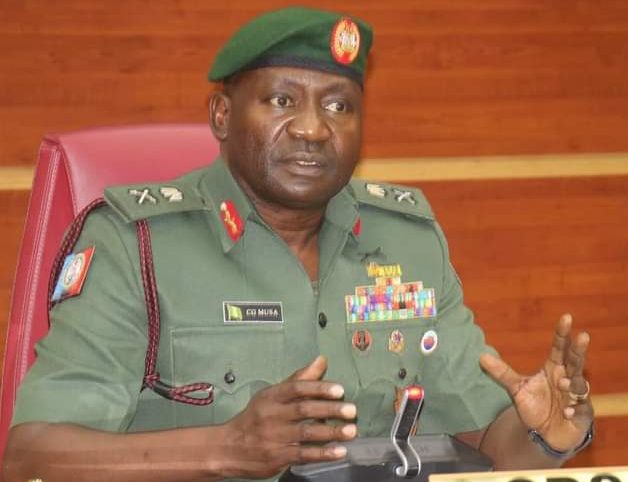General Christopher Musa, Nigeria’s Chief of Defence Staff, recently offered a powerful testament to faith and national resilience. His words, steeped in personal experience and unwavering conviction, serve as a timely reminder of the strength derived from spiritual fortitude and collective prayer, even in the face of daunting challenges.
Like fear, hope, anger and other complex psychological states, faith has built-in to it what’s needed to explain behavior. By way of illustration, all you need to know to understand why Christina behaves in certain ways—confessing his sins, praying regularly, studying the Bible, gathering with Christians, helping the disadvantaged, relying on the two Great Commandments to make moral, social, and political decisions, taking the sacraments, observing the holy days, and so on—is that he or she has faith in Jesus as her Lord.
In doing all this, we aim to understand the faith God desires of people, according to the Abrahamic tradition, and the faith that permeates a variety of human relationships, viewing them as similar phenomena. We focus on relational faith, specifically the claim that it involves resilience.
For example, for Samuel to have faith in God as providential governor of the universe is for him to be disposed to rely on God to come through in that capacity, with resilience in the face of challenges to doing so, because of his positive stance toward God’s governance.
On this note, General Musa’s account of his time as Theatre Commander in Maiduguri is particularly poignant. He vividly recalls how Men of God consistent prayers were a source of immense strength, ultimately leading to answered prayers. This personal anecdote underscores a fundamental belief: “Our God answers prayers. Sometimes, we are the ones that make things difficult for ourselves.” This sentiment, coming from a man at the forefront of national security, carries significant weight, urging self-reflection and a deeper trust in divine providence.
His personal narrative further highlights the unifying power of love and support, regardless of background. Growing up in Sokoto while his wife hails from Delta State, their union symbolizes the diverse tapestry of Nigeria. He lovingly refers to his wife as his “pillar” and “prayer warrior,” emphasizing the crucial role of personal support systems in navigating life’s complexities.
The General’s call to Christians and none Christians to shed timidity wherever they find themselves resonates deeply. He warns against the temptation to shy away from faith in pursuit of worldly aspirations, echoing the biblical caution: “If you are shy of me here, when we get there, I will be shy of you.” This is a powerful message for a nation grappling with various pressures, advocating for unwavering devotion and boldness in one’s beliefs.
General Musa’s address also touched on the pressing issues facing Nigeria and the broader West African region. Acknowledging the “barrage of challenges” and the “unprecedented challenges” posed by extremist groups like the Jihadists, he remains optimistic. His steadfast belief that “the Lord Almighty will never let us down” and that God “will never let them succeed” offers a beacon of hope amidst the darkness. He passionately appeals for consistent and ceaseless prayers from Christians, recognizing their vital role in the nation’s security.
Nigeria, he asserts, is a “blessed country,” a truth recognized globally. He powerfully refutes past predictions of disintegration, noting that despite doomsday prophecies in 2015, “this is 2025, we are still standing.” This defiance against negative narratives serves as a testament to the resilience of the Nigerian spirit and the enduring power of unity.
Ultimately, General Musa’s message is one of profound gratitude and continued appeal. He credits the prayers of Nigerians for the sustained efforts of the Armed Forces in securing and protecting the nation, humbly appealing for their ongoing spiritual support. His words are a powerful reminder that beyond military might, faith and collective prayer are indispensable weapons in Nigeria’s fight for peace and stability. They serve as a call to action for every Nigerian to embrace love, uphold faith, and consistently pray for the nation’s well-being.
In conclusion, General Christopher Musa’s earnest appeal to traditional rulers, religious bodies, and various stakeholders underscores a pivotal strategy in the ongoing war against insurgency. His call for unity and active participation is not merely a request but a recognition of the indispensable role these influential groups play in shaping public opinion, fostering community resilience, and facilitating intelligence gathering at the grassroots level.
Under his leadership, the emphasis is clearly on consolidating these diverse efforts into a cohesive national response. By integrating traditional wisdom, moral guidance, and community-level insights, General Musa aims to build a formidable front against the forces of instability. This collaborative approach seeks to dismantle the support networks of insurgents, address underlying grievances, and ultimately pave the way for lasting peace and security across affected regions. The success of this critical endeavor hinges on the collective will and unified action of all segments of society, guided by a shared commitment to national well-being.
Kennedy Elaigwu Awodi writes from the USA









